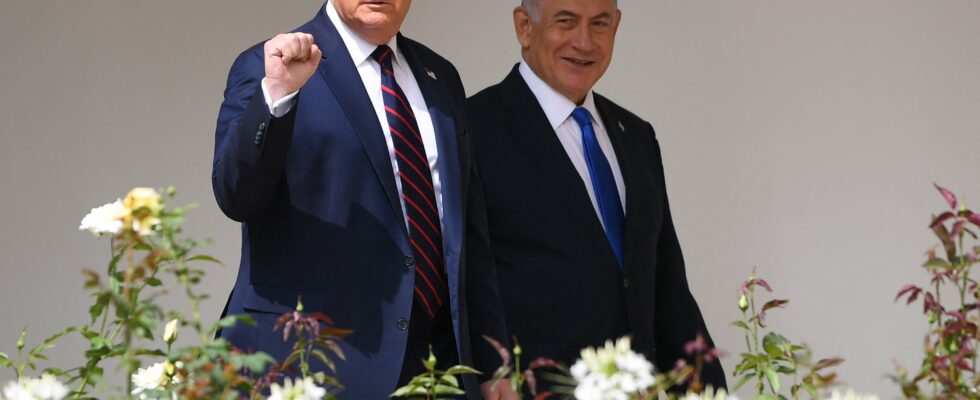Donald Trump has not yet returned to the White House, but his influence is already being felt on the borders of the Middle East. The office of Israeli Prime Minister Benjamin Netanyahu validated, this Tuesday, November 26, a ceasefire agreement in Lebanon, after a low-intensity war of more than a year against Hezbollah and a two-month offensive by the IDF in Lebanon.
Israeli soldiers will withdraw from Lebanese territory over the next sixty days, in exchange for the freedom to intervene again in southern Lebanon if Hezbollah members are seen near the Israeli border. The agreement explicitly recognizes the importance of the Lebanese army and the UN in maintaining peace between the two countries.
An agreement negotiated by the Biden administration and announced by the president in person on Tuesday evening, but which already bears the seal of his Republican successor. “Donald Trump presents himself as a man of peace and can already impose a ceasefire on Benyamin Netanyahu, who didn’t care at all about what Joe Biden told him, perceived as a president on borrowed time, explains the former French ambassador Bertrand Besancenot. On the other hand, Benjamin Netanyahu knows that he has no choice with this new American president, who is very favorable to Israel but who demands that the war be stopped when he takes office.”
For Israel, war goals achieved
Rumors of an end to the fighting in Lebanon had been buzzing for several days already. Israel believes it has achieved its war goals: “cleansing” the area near its northern border of Hezbollah fighters and eliminating the threat from this Lebanese militia for the next few years. Diplomatic sources speak of Hezbollah’s military capabilities degraded to 80-85%, much more than after the 2006 war. At the time, the Shiite organization had taken years to rebuild itself and be able to carry out offensive actions against Israel.
Another factor favorable to this cessation of fighting: the leadership of Hezbollah is completely decimated. Its historic leader, Hassan Nasrallah, was killed in a bombing on September 27, and his potential successors have been eliminated one by one in strikes on southern Beirut in recent weeks. The September 17 pager operation injured thousands of Hezbollah members and above all sowed panic in the organization’s ranks. Paradoxically, these successes of the Israeli army against the command of the militia complicated the negotiations, since it was Shiite politicians who had to speak on behalf of a Hezbollah devoid of fixed leaders.
As a result, this ceasefire was also, and above all, decided in Tehran. The Iranian regime, historic godfather of Hezbollah, has been inflicted with a series of unprecedented setbacks by Israel in recent months, and feared seeing its Shiite militia completely destroyed by the IDF. “Iran is very weakened and Hezbollah extremely weakened, they have no other choice but to regroup at the moment,” summarizes a diplomat from the region.
Weakened, the Iranian regime seeks appeasement
Since Donald Trump’s victory, Tehran has multiplied signs of appeasement towards the West and in particular towards the Americans: the Iranian ambassador to the United Nations is said to have met in person with Elon Musk, the first advisor to the future American administration and “first friend” of Donald Trump, in the days following the election. “Today, Iran is in a weak position, underlines Bertrand Besancenot. Its economic situation is disastrous and on the domestic level the protest has strengthened. The regime finds itself on the defensive, with its jokers – Hamas and Hezbollah – in poor condition It is no coincidence that the Guide allowed a reforming president to be elected. [NDLR : Masoud Pezeshkian, élu en juillet] and let him go to New York to make advances to the Americans…”
Donald Trump, who unilaterally withdrew from the Iran nuclear agreement in 2018, is now putting forward the possibility of a new “deal” with Tehran to prevent a total war in the Middle East. “The Iranians remain very skillful negotiators and hope to limit concessions, but it is very possible that they will accept a form of pause on the nuclear issue, believes Bertrand Besancenot. In Lebanon, Hezbollah will remain an important force but will no longer be as dominant, which can encourage them to make a gesture to allow the election of a president [au Liban].” Fear of Donald Trump could unlock years of impasse in the Land of Cedar. The perfect illustration of the “madman’s strategy” dear to Richard Nixon.
.
